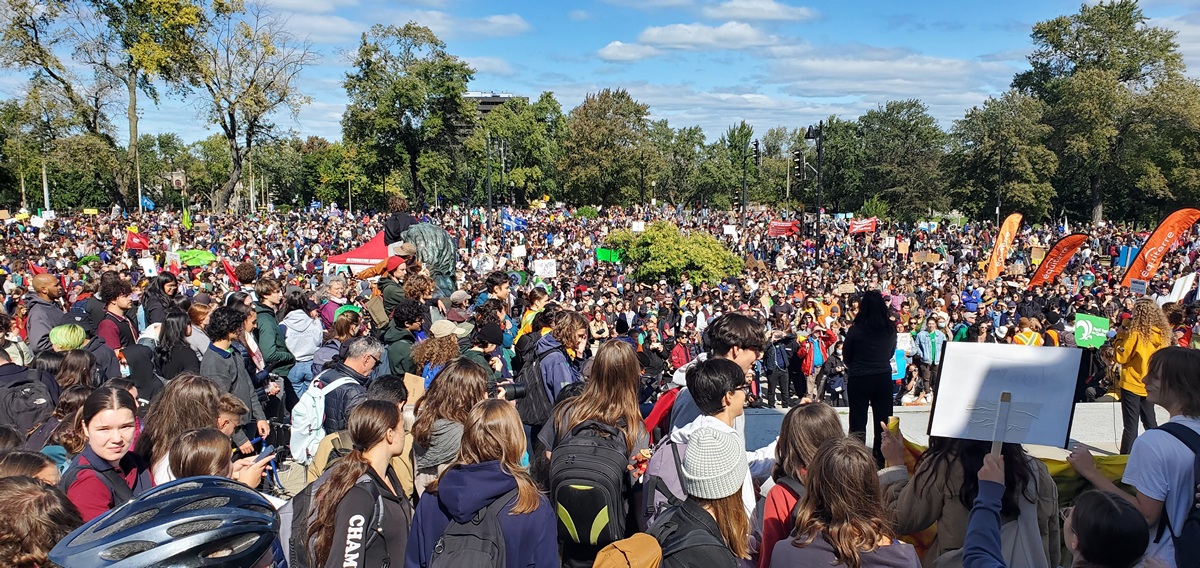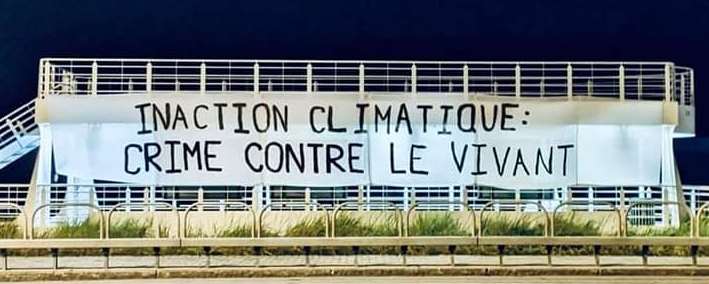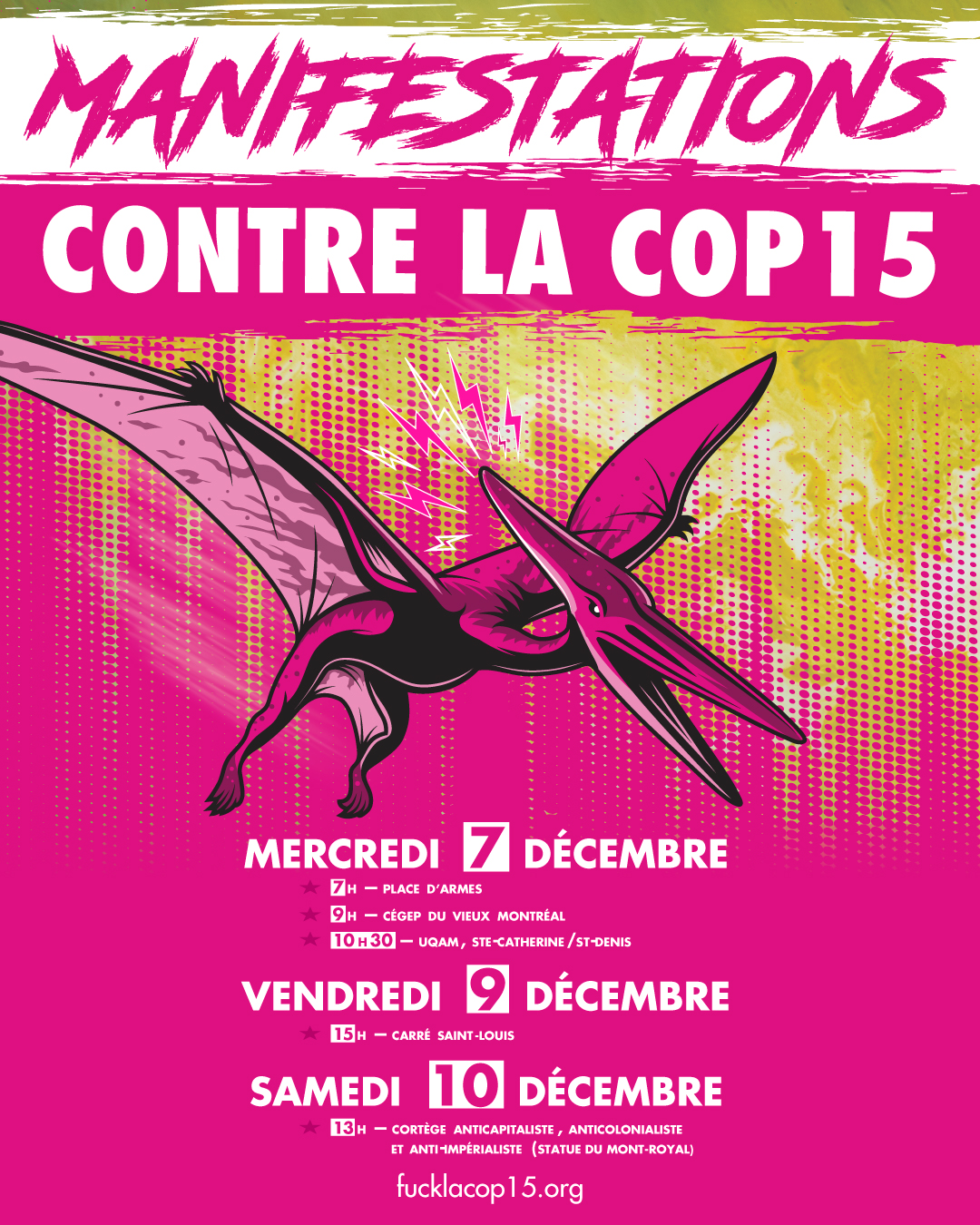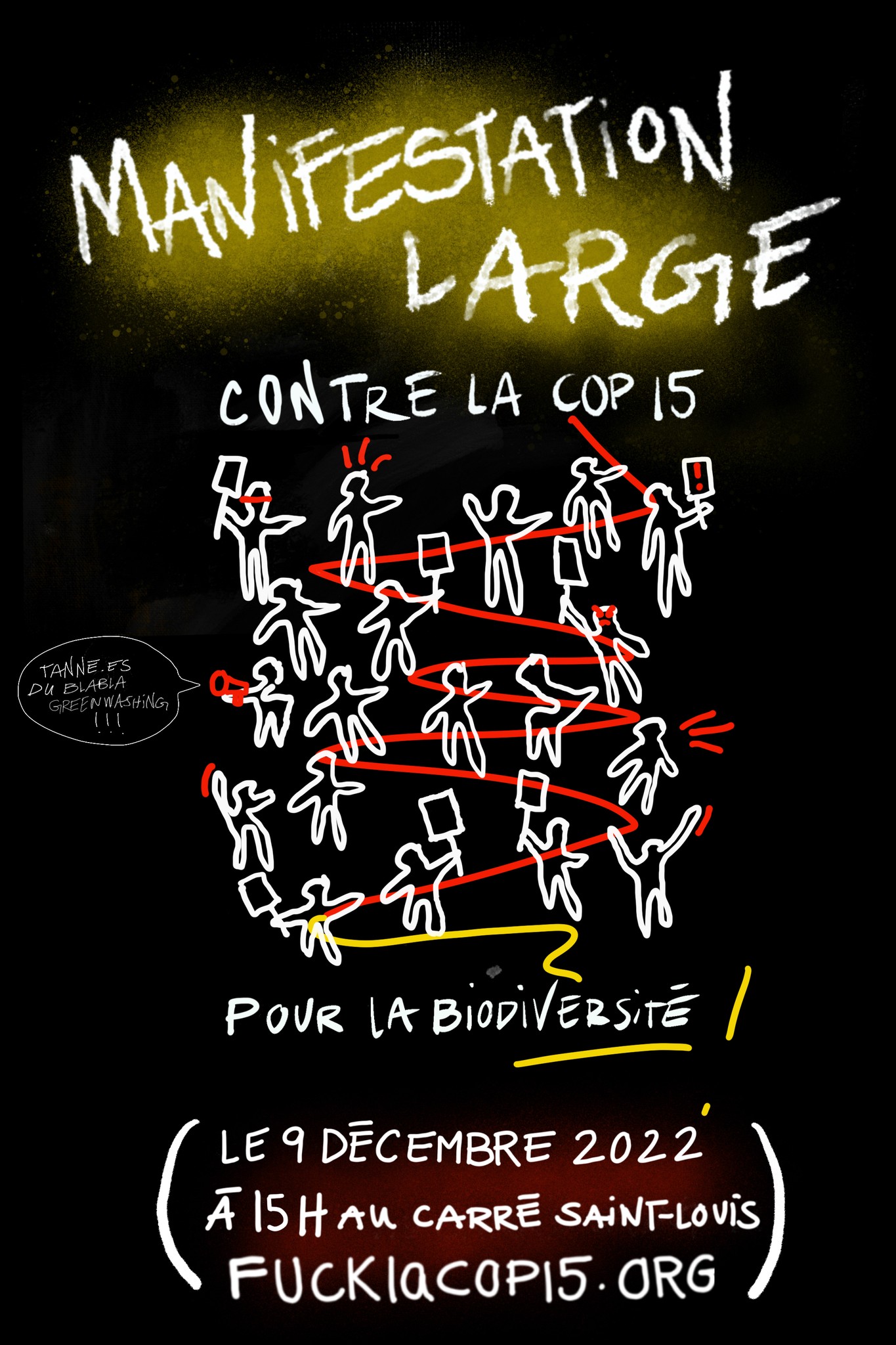December 5, 2022 - No. 54
COP15
Meeting on Biodiversity, Montreal
December 7-19
Talks on
New Framework for UN Convention on Biological Diversity Take Place in
Montreal
 Montreal climate justice action, September 23, 2022
Montreal climate justice action, September 23, 2022
• Massive Police Mobilization as Police Forces Use Biodiversity Conference as Training Exercise
COP15 Meeting on Biodiversity, Montreal
December 7-19
Talks on New Framework for UN Convention on Biological Diversity Take Place in Montreal

The 15th Conference of the Parties (COP15) to the United Nations Convention on Biological Diversity (CBD) is being held in Montreal, home of the UN CBD Secretariat, from December 7 to 19. The CBD was signed at the Rio Earth Summit in 1992 and later ratified by about 195 countries, but notably not the U.S. Today, there are 196 parties to the CBD and 12,000 delegates from these countries are expected to take part in the Montreal conference. Prime Minister Justin Trudeau is expected to address the Conference but no heads of state or other government leaders are expected.
The Montreal proceedings are the second phase of a process that began last year in Kunming, southwestern China, aimed at negotiating and adopting a "post-2020 Global Biodiversity Framework." The framework would build on the UN 2011-2020 Strategic Plan for Biodiversity and the Aichi Biodiversity Targets signed in Aichi, Japan in 2010. The Aichi pact set 20 targets to try to slow biodiversity loss by 2020, none of which were met in full.
The Presidency of COP15 is currently held by China where this phase of COP15 was originally to take place in Kunming. It was relocated due to COVID-19 outbreaks.
Huang Runqiu, COP15 President and China's Minister of Ecology and Environment, in a December 3 interview with China Daily, elaborated on the significance of the need to protect biological diversity. He said in part:
"Our clothing, food, shelter, means of travel -- every aspect of our material and cultural lives -- are closely related to biodiversity. Biodiversity provides us with rich food, fresh air, clean water and the necessities for production and life such as clothing, lumber and raw materials for medicine and industry. It makes the Earth full of vigour and vitality, fertilizes the Earth like water and roots [nourish a plant] and lays the foundation for sustainable economic development.
"Data show that about half of global GDP is related to biodiversity. Over three billion people's livelihoods depend on marine and coastal biodiversity. Over 1.6 billion people's livelihoods depend on forests and non-lumber forest products. And about 70 per cent of people living in poverty depend on activities like agriculture, fishing and forestry. As for health care, 70 per cent of cancer drugs are natural products or originate from chemical compounds found in natural products.
"In addition, biodiversity plays an important role in maintaining the natural ecological balance, for instance, by fostering water sources, purifying the environment, conserving water and soil, preventing or mediating natural disasters, safeguarding food security and protecting human health.
"Over the years, the international community has become fully aware that biodiversity is of utmost importance and has acted to protect it.
"However, the deterioration of biodiversity has undergone no fundamental changes.
"In May 2019, the Intergovernmental Platform on Biodiversity and Ecosystems Services published a report. It shows that due to human activity, 75 per cent of the Earth's terrestrial environment and 66 per cent of its marine environment have been significantly altered, more than 85 per cent of wetlands have been lost, and about one-fourth of species face the threat of extinction.
"The International Union for Conservation of Nature (IUCN) said in a 2020 report that 41 per cent of amphibians, 26 per cent of mammals and 14 per cent of birds are threatened with extinction. The global biodiversity crisis is worsening.
"In the face of global biodiversity loss, we humans live in a community of a shared future and no country or organization or individual can remain immune."
Referring to the proceedings of the Montreal conference, Zhou Guomei, head of the international department of China's Ministry of Ecology and Environment, told reporters on November 28 that negotiations so far had not been "smooth sailing." An agreement is sought at the Montreal conference which he described as "ambitious" but also "pragmatic, balanced, feasible and achievable."
In last year's first phase of talks, more than 100 nations signed the Kunming Declaration that calls on signatories to urgently include biodiversity protection in all sectors of the economy. Where consensus was not reached was on issues such as funding conservation efforts in poorer countries, Zhou said. He explained that there are still differences on a number of issues. A successful agreement would depend on what mechanisms are found to mobilize resources and financial support to actually implement the objectives of the forthcoming biodiversity framework, he said.
Cui Shuhong, head of the natural ecology department of China's Ministry of Ecology and Environment, stated that countries need to "fully consider" the attainability of any new targets.
"We should learn fully from the experience and lessons during the implementation of the Aichi targets, not only to boost the ambition and confidence in global biodiversity conservation, but also to be down-to-earth and realistic," he said.
(UN CBD Secretariat, Government of Canada, Reuters, China Daily)
Events Calendar
Montreal
Great March for Life
Saturday, December 10 -- 1:00-5:00 pm
Sir
George-Étienne Cartier Monument, Mount Royal Park
Organized by COP15 Collective
Sixty-seven civil society organizations in Quebec have set up the COP15 Collective which is organizing a "Great March for Life" event on December 10. The COP15 Collective brings together organizations from the environmental and conservation sectors, international development, youth, Indigenous organizations, unions, financial organizations, philanthropic foundations and research centers. It describes COP15 as a turning point for the preservation of life. The Collective is already mobilized to take action on the unprecedented loss of biodiversity in Quebec and around the world.
Other demonstrations directed at COP15 on December 7 and 9 say it has the cynical aim of greenwashing the activities of those who benefit from the destruction of biodiversity: "In the face of the climate crisis, we need a system change that COP15 cannot provide. Indeed, [COP15], follows closely on the heels of the UN's decade of mobilization on biodiversity. Faithful to their greenwashing habits, states and ecocidal companies will take advantage of this summit to finance the destruction of biodiversity by shaking hands happily," organizers say.
"We cannot accept this hypocrisy while the consequences are felt in the poorest countries and the most marginalized populations: the solution lies in action and popular resistance. This is a call to all individuals and groups who wish to join a large demonstration for biodiversity and against COP15.
"COP15 risks being one of the last summits in Montreal: let's mobilize against this 15th masquerade, against the race for profit and against rotten reforms!," organizers say.
Wednesday, December 7
7:00 am -- Gather at Places d'Armes
9:00 am -- Rally at Cégep de Vieux Montréal
10:30 am -- Rally at UQAM, corner of Ste-Catherine and St-Denis
Friday, December 9 -- 3:00 pm
Demonstration Against COP15 and for Biodiversity!
Saint-Louis Square, Montreal
Massive Police Mobilization as Police Forces Use Biodiversity Conference as Training Exercise
A massive police presence and various heightened security measures are being deployed in Montreal for the COP15 proceedings being held at the Palais des congrès from December 7-19. It is the biggest and most complex police operation in Montreal in 20 years, a spokesperson for Montreal police told media on November 3. The operation includes a large security perimeter that has already been set up around the Palais des congrès.
According to news agencies, security at COP15 is being provided by the Integrated Security Unit (ISU), which includes the Royal Canadian Mounted Police (RCMP), the Sûreté du Québec (SQ) and the Police Service of Montreal (SPVM).
The main message raises the spectre of a lethal attack being launched against the conference with the ISU saying that it is ready to respond to any situation during COP15, even worst-case scenarios of chemical, biological, radiological, nuclear or explosive (CBRNE) threats. It prides itself for not ruling out any scenario owing to what it termed the "tense global socio-political context." According to Tasha Adams, a Corporal with the Royal Canadian Mounted Police, "During any major event, a CBRNE protocol is an integral part of the integrated security group's operational plan. In this case, the CBRNE team will be mobilized as needed."
In day to day life, none of these police forces are known to provide the security the people need. Far from it, they have earned reputations for negligence or violence against the most vulnerable in society -- national minorities, those with mental illness, youth, women, homeless people and Indigenous peoples. The aim of the security measures taken at this time is mostly to provide police with the opportunity to conduct live exercises in an urban environment.
Based on the people's experience with mobilizing against the Organization of American States General Assembly in 2000 in Windsor, against the Free Trade Area of the Americas and militarization of Quebec City during the 2001 Summit of the Americas, against meetings of the G20 in Ottawa in 2001 and in Toronto in 2010, and the 2004 visit of George W. Bush to Ottawa , amongst others, it is reasonable to conclude that an aim of the state and its police and intelligence agencies is to use the conference to conduct training exercises as they have done at each of these events.
In Quebec City one of the aims set was to see how many tear gas canisters per minute they could hurl at demonstrators behind the security perimeter. In Ottawa they used dogs to allegedly sniff out explosives - a highly unsuccessful and unpopular experiment. In Toronto they eventually had to pay thousands of dollars in restitution to demonstrators who were kettled and held in holding patterns in conditions which violated their civil and human rights.
It is also reasonable to assume that talk about chemical, biological, radiological or nuclear weapons is aimed at bolstering the promotion by the intelligence services that Canada's security is threatened and Canadians should support laws being passed which are justified in the name of curtailing foreign interference in Canadian affairs.
News agencies report that the SPVM will be responsible for security outside the event site, in the Old Port of Montreal, assisting with escorting convoys and managing traffic and crowd control. The SQ will also accompany the convoys of dignitaries and manage traffic.
The SPVM gave an estimated cost of $25 million for the operation, which will be paid in part or full by the federal government. The total number of officers to be deployed is unknown, but the SPVM has asked its officers to volunteer to work during the event. Police officers from Quebec City, Laval, Longueuil and Gatineau will also be sent in to assist the SPVM.
Security measures also include response plans for scenarios in which COP15 delegates, and possibly protestors as well, are exposed to hazardous materials, regarding how they would be treated and where. Scenarios include resolving problems such as where people would go in the event that an evacuation is required. According to reports, the Palais des congrès is to be declared an international zone under the responsibility of the United Nations Department of Safety and Security.
The Centre hospitalier de l'Université de Montréal (CHUM) is also said to be preparing "for all eventualities."
Irène Marcheterre, CHUM's director of communications, in an interview with La Presse, stated, "Our biggest concern is the demonstrations or marches that could happen unexpectedly around our perimeter, which would slow down access to the care environments." CHUM is asking organizers to respect access to the hospital, so that they can take care of patients who need it, she said. Why demonstrators would seek to curtail access to hospitals she does not say, but the CHUM does say it set up a crisis unit at the end of October based on an assumption the demonstrations would be like the student strikes in 2012 or the massive climate demonstration of half a million people in September 2019. It all serves to militarize life and feed the scenario of the intelligence agencies that the people are lawbreakers whose activities pose the dangers to the population.
"We have added a team of security agents with officers and event agents who will be able to move from one entrance to another, depending on the event. We're talking about a dozen more agents at first, but we could add more," says Josée Rondeau, CHUM's emergency measures and security coordinator.
The hospital will also be adding several traffic wardens, in addition to the Montreal police, to help adjust ambulance routes in the event of obstructions, CHUM said.
(To access articles individually click on the black headline.)
Website: www.cpcml.ca Email: editor@cpcml.ca



